-
Rendez-Vous with French Cinema 2010 at Lincoln Center
Rendez-Vous with French
Cinema 2010
Coverage and reviews by Chris Knipp
Reviews and descriptions will appear here from Feb. 16 following.
To comment go to the Filmleaf Forums comments and notifications thread for this year's Rendez-Vous here.
Links to the reviews:
8 Times Up (Xabia Molia 2010)
Army of Crime, The (Robert Guédiguian 2009)
Farewell (Christian Carion 2009)
French Kissers, The (Riad Sattouf 2009)
Hedghog, The (Mona Achache 2009)
I'm Glad That My Mother Is Alive (Claude and Nathan Miller 2009)
In the Beginning (Xavier Giannoli 2009)
King of Escape, The (Alain Guiraudie 2009)
Mademoiselle Chambon (Stéphane Brizé 2009)
Making Plans for Léna (Christophe Honoré 2009)
OSS 117: Lost in Rio (Michel Hazanavicius 2009)
Rapt (Lucas Belvaux 2009)
Regrets (Cédric Kahn 2009)
Refuge, Le (François Ozon 2010)
Restless (Laurent Perreau 2009)
Thorn in the Heart, The (Michel Gondry 2010)
Welcome (Philippe Lioret 2009)
Wolberg Family, The (Axelle Ropert 2009)
RENDEZ-VOUS 2010 SUMMARY: CK thumbnail reviews and picks
Press Screening Schedule
Please join us for advance press screenings at the Walter Reade Theater 165 West 65th Street, close to Amsterdam Ave. P
Tuesday, February 16th
10am
The Army of Crime (L'armée du crime); 139m
Wednesday, February 17th
10am
Regrets (Les Regrets); 105m
12pm
Restless (Le bel âge); 97m
Thursday, February 18th
10am
Mademoiselle Chambon; 101m
Friday, February 19th
10am
The King of Escape (Le roi de l'évasion); 97m
12pm
The Thorn in the Heart (L'épine dans le Coeur); 86m
1:45pm
OSS 117 - Lost in Rio (OSS 177-Rio ne répond plus); 100m
Tuesday, February 23rd
10am
8 Times Up (Huit fois debout); 103m
12pm
Making Plans for Lena (Non ma fille tu n'iras pas danser); 105m
2pm
The Hedgehog (Le hérisson); 100m
Wednesday, February 24th
10am
Rapt; 125m
12:20pm
The Law (La loi/La legge); 126m
Thursday, February 25th
10am
**In the Beginning (A l'origine); 120m
**TENTATIVE SCREENING DATE/TIME - please contact Emilie directly for updates
Friday, February 26th10am
The Wolberg Family (La famille Wolberg); 80m
11:45am
**Farewell (L'affaire Farewell); 113m
**TENTATIVE SCREENING DATE/TIME - please contact Emilie directly for updates
2pm
**White as Snow (Blanc comme neige); 104m
**TENTATIVE SCREENING DATE/TIME-please contact Emilie directly for updates
Monday, March 1st
10am
The French Kissers (Les Beaux Gosses); 90m
11:45am
I'm Happy That My Mother is Alive (Je suis heureux que ma mère soit vivante); 90m
1:30pm
Hideaway (Le refuge); 88m
Last edited by Chris Knipp; 02-17-2015 at 09:19 PM.
-
Robert Guédiguian: The Army of Crime (2009)
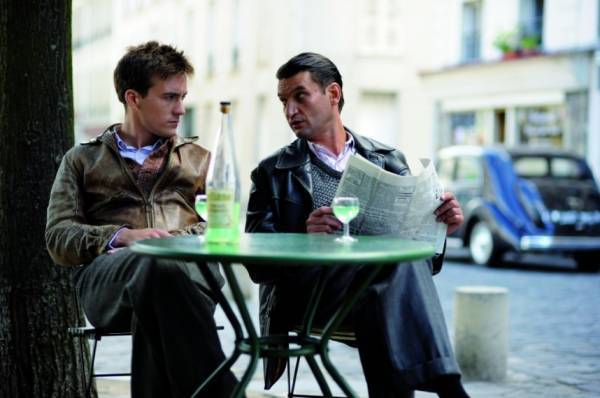
GRÉGOIRE LEPRINCE-RINGUET, SIMON ABKARIAN
Robert Guédiguian: The Army of Crime (2009)
The French resistance from another angle
A rousing, lengthy and straightforward political thriller about a key aspect of the French resistance during the Second Wold War, Robert Guédiguian's new film focuses on the movement's early stages, when both leaders and foot soldiers made up an organization called the FTP-MOI: Francs-tireurs et partisans – main-d'œuvre immigrée or Partisans and Irregulars - Immigrant Work Force. it was made up of non-Party member communists or communist sympathizers of foreign, often Jewish, origin -- Spanish, Romanian, Hungarian, Polish, Italian, or, like the director himself, Armenian. Of course resistance tales have been told before, most recently (in a film seen in the US) Danish director Ole Christian Madsen's Flame and Citron, about his country's most famous resistance fighters. Some will point to Jean-Pierre Melville's grim 1969 saga Army of Shadows/L'armé des ombres, which was given its first-ever US release to extravagant praise in 2006. This particular subject had been dealt with in the 1976 French feature L'affiche rouge.
Guédiguian's film lacks the noirish flavor of Melville or the Butch Cassidy and Sundance panache of Madsen's film; but it starts well with Grégoire Leprince-Ringuet and Robinson Stévenin as two brave young men who begin acting on their own, and later are recruited to serve a more organized cause. There were always contrasts between young upstarts and disciplined old-timers. Resistance fighters worked outside the law and sub rosa; the "shadow" army was an army of "crime." Though the phrase "Army of Crime" is a Vichy smear issued after the principals of this story were rounded up and eliminated, the resistance life always attracted rebels and outliers.
The gentle Armenian poet Missak Manouchian (Simon Abkarian) is the leader. His ballsy girlfriend Mélinée (the lovely Virginie Ledoyen) marries him and becomes a passionate supporter after his release from internment gradually turns him from peaceful propagandist to one capable of throwing a grenade into a German marching squad and taking out a dozen German soldiers (an incident neatly filmed here). He gets to know fiery young Marxist bomb-rigger Thomas Elek (Leprince-Ringuet) and swim champion/pistol killer Marcel Rayman (Stévenin). Marcel becomes infuriated when his parents are taken away and he learns that he won't ever see them again. He begins asking one German officer after another for a light and then pulling a pistol and killing them. He's good at less close range too and gives Missak a lesson in marksmanship. Thomas blows up a Nazi literary gathering by planting a big copy of Das Kapital with a time bomb inside.
Older group leaders periodically chide the younger ones for acting independently and not maintaining cover; but it is one of the older ones who eventually names many members of the group after capture. Various group scenes, including an Armenian musical celebration with Zorba-style performances visited by a group of French cops, show that the authorities are onto the foreign communists and the rashness of one can endanger many.
We get a look at French cops called upon by German occupiers to squash the resisters. They enlist a certain Inspector Pujol ( Jean-Pierre Darroussin), who plays a dubious Judas game of informing, rounding up Jews, and gaining rapid promotion by the French Gestapo while simultaneously sympathizing with the partisans, sleeping with a Jewish girl, and doling out favors to her, including gentler treatment for her interned family members. She wants to be a partisan too, but seems destined to go the way of the anonymous protagonist of Max Färberböck's A Woman in Berlin -- sleeping with the enemy to save her neck.
The FTP-MOI throws out flyers (from hidden locations atop buildings, so they won't be seen) urging the French to sabotage Vichy-run industries. Their other mission is to strike visible blows at the Nazis, assassinating major figures of the Nazis in France like General Julius Ritter.
A theme of the film is the complex bonds forged among immigrants and the loyalties among resisters. Missak, whose parents were murdered by Turks, looks upon his Parisian communist friends as his new adopted family. Marcel knows there's no one in his family left but his little brother Simon (Léopold Szabatura), and so takes him everywhere; the unfortunate consequence is that in a raid targeting Marcel, Simon is taken away. An original touch is a homage to the young militant, Henri Krasucki (Adrien Jolivet), who took it upon himself to bring Simon back alive from the concentration camp where they were sent.
In The Army of Crime, the mix of nationalities and motivations is continually interesting and harmonizes nicely with the picture of how quite disparate individuals came together. Very important also is that toward the end, Guédiguian films sequences of the mass corralling and deportation of Jewish people by the French out of a stadium, an infamous moment that deserves to be seen as well as read about. The film is less effective in evoking strong emotion, and despite its generally favorable reception in September in France (after a Cannes summer debut), it's been criticized for a lackluster mise-en-scène. Some communist historians in France have insisted that Marcel is over-mythologized; that there was more restraint and coordination and more direct Soviet supervision than is shown. However the film's strengths remain its focus on youth and its strong ethnic and cultural mix.
This is involving, fascinating stuff, and as good an evocation of that place and time as I can think of, but it doesn't seem as personal as the other films by Guédiguian that I've seen -- The Town Is Quiet (in US theaters) and Lady Jane (SFIFF). But since he is a communist of working-class origins with an Armenian father, it may be in another sense the most personal thing he has done. Another film of his, the 2006 Armenia/Le voyage en Arménie, is about rediscovering Armenian roots.
Shown as part of the Rendez-Vous with French Cinema (co-sponsored by the Film Society of Lincoln Center and uniFrance) screened at the Walter Reade Theater, Lincoln Center and the IFC Center, New York March 2010.
Last edited by Chris Knipp; 08-06-2014 at 01:31 PM.
-
Cédric Kahn: Regrets (2009)
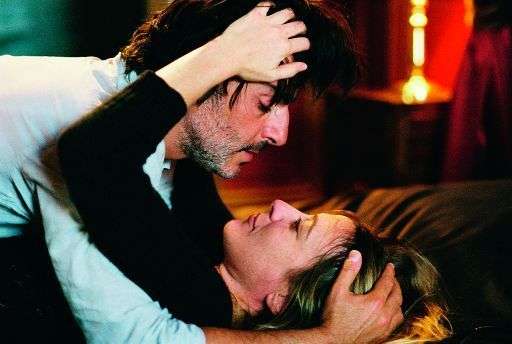
YVAN ATTAL AND VALERIA BRUNI TEDESCHI IN REGRETS
Cédric Kahn: Regrets (2009)
L'amour fou as thriller frenzy
Yvan Attal runs circles around Valeria Bruni Tedeschi in Cédric Kahn's balls-out story of love passion and emotional confusion, Regret/Les regrets, a movie about a youthful love affair renewed fifteen years later when both lovers are married to other people. The heartbeats are fast, and even if it feels more like anxiety than passion, Kahn and his stars take us on a wild ride. This is a lot of silliness, but it's also fun and beautifully photographed, and it does powerfully evoke the feelings of adolescent romantic obsession -- except that the adolescent here is a grown man acting very immature and unwise. If there's an American remake, it can't be this good, because the French can do l'amour fou better than we can.
Mathieu Liévin (Attal) is a middle-aged architect, married but without children, who runs into old flame Maya (Bruni Tedeschi) in the town square while back home with his mom dying in the hospital. The camera tracks in on both of them with that "gotcha" effect that means, these two folks are going to zoom in on each other pretty soon.
What follows is all the chaos and excitement of a first-rate thriller, but without any dead bodies, though there are moments when you wonder if Matthieu and Maya are going to make it through alive. Much reckless endangerment occurs here, as well as chasing cars and trains and running from a man armed with a chainsaw. Maya turns out to have a drunken husband called Frank (Philippe Katerine) who's in the wine business and has a tendency to hatch elaborate schemes involving outside funding. Maya is maddeningly indecisive. Fifteen years ago Matthieu and Maya parted because they were driving each other crazy. They get right back into it in short order, except that life now is much more complicated.
Matthieu's architect wife Lisa (Arly Jover) is pressuring him to enter competition for a major project. After his mother dies his ne'er-do-well brother wants to sell her house to pay off debts. Frank has his schemes, which Maya keeps committing to; she also has a daughter by a deceased African husband. The omnipresence of cell phones and the possibility of texting (energetically used, and romantic, here) seems to speed up the confusion and the wild pursuits. Maya is on and off about all this, ready to run off with Matthieu one minute, completely opposed the next.
Kahn, who wrote as well as directed, has experience with serial-killer, crime-suspense, and sexual-obsession themes, and the mood here is one of thinly veiled criminal insanity on the part of Matthieu, with Maya as an unreliable but often equally mad collaborator. The film is skillful at weaving this pattern of wild behavior impulsively around the obstacles of the principals' everyday lives and commitments. This is adultery, of course, but it's a pumped-up, hyperventilating kind that we've rarely seen on screen, a kind that looks more akin than usual to flat-out criminal activity and is paced like a thriller. Attal is good as the hyperactive lover in his second adolescence, and Bruni Tedeschi is convincing and superb-looking as the old flame he can never see without grabbing and kissing and more often than not quickly making love to on a table top or a stairway. Full disrobing never occurs. Shouting matches can occur anywhere. Matthieu is continually confrontational, and Maya is unable to confront.
Some Phillip Glass pieces are particularly well used during an ominous car ride when the adulterous couple is rushing away together and their desperation seems suicidal. The good-looking images are thanks to cinematographer Céline Bozon.
None of this necessarily means anything, but Kahn is having fun with his blend of unlikely elements and he takes the viewer on an enjoyable ride. The near-absurdity of the behavior at times drew derision at Cannes. On the other hand, the feelings that are evoked seem perfectly valid as a description of the vagaries and torments of love -- in a brilliantly heightened and updated form.
Shown at Cannes, Les regrets debuted theatrically in France September 2, 2009 to fair-to-good reviews. Shown as part of the Rendez-Vous with French Cinema, sponsored jointly by the Film Society of Lincoln Center and Unifrance and screened at the Walter Reade Theater and the IFC Center in NYC., March 2020.
Last edited by Chris Knipp; 02-24-2010 at 01:34 PM.
-
Laurent Perreau: Restless (2009)
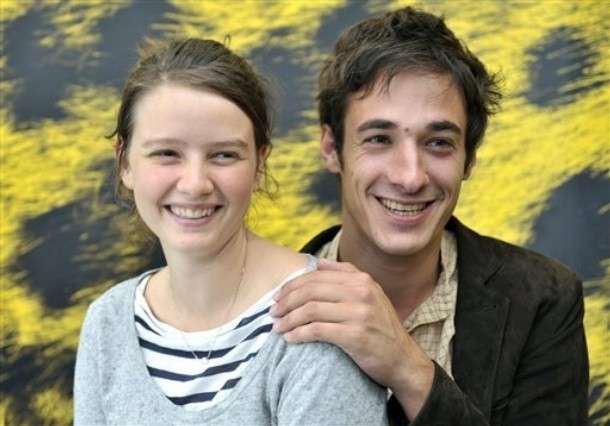
YOUNG ACTORS PAULINE ÉTIENNE AND CLÉMENT ROUSSIER POSE FOR A PHOTO CALL
Laurent Perreau: Restless (2009)
The restless age, and restless old age
Laurrent Perreau's Le bel âge is a coming of age story with a failed love affair and a swimming competition, but most of all it's a mood piece about an old man and a young girl, his lonely granddaughter, who share a French chateau and reluctantly discover they have things in common. A dodgy structure explains the only fair-to-good reviews the film has received in France since it opened at the end of 2009. Despite a disjointedness as "restless" and unfocused as its young female lead, the film's still a sensitive dual character study, and it nails the pain of young romance.
At 17, Claire, an orphan who lives with her grumpy old grandfather, Maurice, is training for swim races but goes to a club late at night to meet or avoid boys. She walks over to Thomas to avoid two other boys and makes him pretend they're friends. This intimacy makes Thomas fall instantly in love with her.
When Claire leaves the club after her first meeting with Thomas she has a bike accident, cuts her head, and discovers Maurice's dog, Morphée, has been killed on the road. The sequence is symbolic, perhaps of the harshness and isolation of her and her grandfather's lives; it's an opportunity to show how stubborn and independent Claire is. Thomas works at a casino "spying" on people by watching surveillance camera monitors behind the scenes and she gets in the habit of hanging out with him there.
But Claire is like Maurice, her lonely grandfather, though she goes so far as to hide under the bed at times to avoid contact with him. She's used to fending for herself and feeling abandoned emotionally; Thomas' romanticism is a bit much for her. In time, she breaks his heart. And then she realizes what a terrible mistake she has made.
Meanwhile though Claire is not attending her lycée, she's working daily to prepare for swim competition. Her coach Rafaël (Eric Caravaca) is teaching her how to use her emotion and avoid spooking herself with too much mental analysis before matches, and her times, though irregular, are improving overall. Though not as rich in atmosphere as those in Céline Sciamma's 2007 film about girl swimmers Water Lillies/'Naissance des pièvres, Restless' swim sequences are convincing
The talented young Pauline Étienne (Claire) is a surprisingly good match for the cinema giant Michel Piccoli (Maurice). Unfortunately most of the time they are not in the same film, until somewhat artificially this spry man has a fall and is hospitalized for a while, as a result of which he winds up telling Clair the true story of how he got a bullet in his shoulder long ago. The revelation creates a deeper bond. A mysterious brooding role is assigned to Piccoli here that he takes on very well, even if the unhappy old guy on an estate is a bit of a Eurofilm cliché by now (more fully developed with Trintignant's character in Kieslowski's Red). Who Maurice is, what his WWII experiences exactly were, how he got here, are unexplained. He has only one friend, a hooker named Madeleine (Johanna ter Steege), who gives him (slight) sexual satisfaction and comfort; but he rejects even her. Still a good role for Piccoli, now 84 but very much alive; he even does a charming little turn performing Yvette Gilbert's classic Belle Époque song "Le Fiacre."
Restless is beautifully photographed by Céline Bozon, who also did two other Rendez-Vous 2010 films, Kahn's Regrets and Axelle Ropert's The Wolberg Family/La famille Wolberg. Understated as it is, the film surprises with its rich mise-en-scène, which jumps from swimming pool to chateau to Thomas' flat to nightclub to gambling casino, and people appear without being identified in an interesting way, especially people associated with Thomas, who indirectly reveal that despite his love of poetic prose passages and dreams of romantic idyls, he's not the loner Claire and Maurice are. With its mix of physicality and the ethereal this movie occasionally evokes Claire Denis, though without quite her warmth.
The real French title Le bel âge, The Best Age, is doubly ironic, since the focus is alternately on the torments, isolation, and uncertainties of two periods of life, adolescence and old age, neither of them seen as particularly happy, though the story ends with an embrace of granddaughter and grandfather and a shot of Clair exploring a new land, perhaps in search of Thomas.
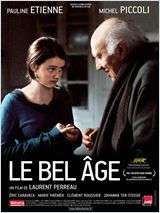
Restless/Le bel âge, also known by its introductory title "L'Insurgée" (The Rebellious Girl) opened in Paris December 30, 2009 and is part of the Rendez-Vous with French Cinema at Lincoln Center, March 2010.
Last edited by Chris Knipp; 02-25-2010 at 05:27 PM.
-
Stéphane Brizé: Mademoiselle Chambon (2009)
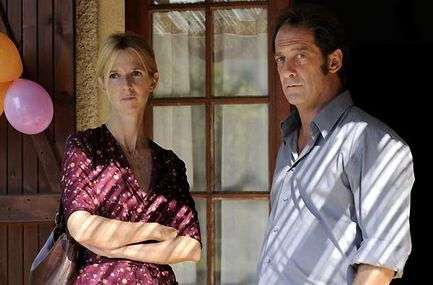
SANDRINE KIBERLAIN, VINCENT LINDON IN MADEMOISELLE CHAMBON
Stéphane Brizé: Mademoiselle Chambon (2009)
A sweet sadness
In Stéphane Brizé's restrained fourth film (which he's adapted from a 1996 Éric Holder novel) a tight-lipped mason named Jean (Vincent Lindon) in an unnamed provincial French town meets his little boy's schoolteacher, the Mademoiselle of the title (Sandrine Kiberlain) and his world subtly changes. He loves his wife Anne-Marie (Aure Atika), who works in a print shop, and little Jérémy (Arthur Le Houerou), but Mademoiselle (her name is Véronique, but Jean never gets beyond the formal "vous" with her) has a refinement, a delicacy. And she plays the violin -- classical music that Jean seems unfamiliar with but delighted by.
At first Mademoiselle asks Jean at the last minute to fill in and speak to her class (and his son's) about his work, an experience that also gives him great pleasure. Perhaps he enjoys indirectly telling this refined maiden lady who attracts him about his basic, satisfying work, building houses that are always different and will last, as one child asks, "for your whole life." Then when she asks help with a broken window at her flat, he takes a look and then insists on being the one to replace it. Then comes the music. He insists that she play; photos and the violin tell him of her former profession.
This film has only a hint of sex, and no raw physicality, but it works with the body, with silence, and with gesture. Throughout it shows Lindon acting the part by doing hard construction work on screen, breaking up paving with a pneumatic drill, mounting the window, laying bricks of a wall, and so on. He even walks like a skilled laborer. Anne-Marie is always ironing, cooking, shopping, making lists. Mademoiselle Chambon reads, rests, places her hand delicately on her neck. Jean tenderly washes the feet of his old father (charming veteran Jean-Marc Thibault).
Finally the teacher plays a recording of chamber music at her place for Jean and as they sit together listening they slowly hold hands, embrace, and cling together as if at home, but afraid to go further. This carefully paced sequence is one of the film's most effective. However many "make-out" scenes you may have seen, this one still feels fresh. Lindon is like a fine mason in his acting, slowly, patiently laying the bricks of gesture. A silence and a pause can speak volumes.
Both Véronique and Jean fight their attraction. And can it go anywhere? But it keeps growing, despite gestures in the opposite direction. Jean tells Mademoiselle that her CD's interest him even though he hasn't listened to them yet. She usually changes schools every year, but tells him, in a key scene, that she's been asked to fill in for someone and stay on. But instead of expressing enthusiasm, Jean blurts out that his wife is pregnant.
This is one anchor to the family: one child, and another coming. Another is Jean's father. Jean and Anne-Marie are planning a big birthday party for the old man at their house with family members coming from all over. Family matters. But Jean shows how far his feelings have gone in another direction -- even though we've seen only those restrained moments -- when he invites Mademoiselle Chambon to come and play the violin for his father. It's not certain that his wife has suspected anything, but she has noticed that Jean seems bored, indifferent, irritable. And she might suspect why now.
What follows is surprising -- agonizingly suspenseful -- and quite familiar. We've seen this kind of story before. We've seen these characters before. But we've rarely seen more delicacy than Bizé brings to his treatment of the story, which is haunting in a classic way without feeling in any way retro -- though perhaps the provincial setting was chosen to avoid that, to have events unfold in a place that's less aggressively modern and hip than Paris.
Lindon and Kiberlain are husband and wife, though now estranged, which may help explain the magnetic energy in their scenes together. There are plenty of lines here, but there's a distrust of language, together with a touching desire to use it properly. "I'd like to hear more tunes," Jean tells Véronique. "Is that right, to say 'tunes'?." At the outset, Jérémy poses a homework problem to his parents to find the "direct object" in a sentence and they haven't a clue, but patiently figure out what this means. Bizé is great with the children. Arthur Le Houerou as the son is unfailingly alive and natural; and his classmates are spontaneous and charming (though primed, as classes are) when they excitedly ask Jean about his work.
If there is a weakness to the film it's the danger that the differences of class and culture are spelled out a tiny bit too clearly. Jean is a kind of noble savage, or one of D.H. Lawrence's men, strong, inarticulate, earthy, ready to be swept away by the squeal of a violin in a drawing room. Lindon is a magnificent actor, but as a man with many illustrious relatives and one-time suitor of Princess Caroline of Monaco he is not exactly drawing on personal experience in playing a mason whose father was also a mason. Nonetheless he is for the most part utterly convincing. It's the film itself that plays on broad differences that a screenplay of 90 minutes duration cannot quite adequately delineate. Lindon has a harried, careworn, but solid quality that fits a working man in need of reawakening. Kiberlain seems held inward, decent but tragically needy. You wouldn't know that she's been around the block with the actual Lindon and had a child by him; she could be this uptight maiden lady on the brink of lifelong spinsterhood. There's a sadness about her, a sweet sadness.
Opened in mid-October 2009 in Paris, this film is part of the Rendez-Vous with French Cinema at Lincoln Center for 2010. What a contrast with the mad body-presses and adulterous whirlwind of another film in the series, Cédric Kahn's Regret. When it comes to the varieties of love, the French have the bases covered.
Last edited by Chris Knipp; 02-19-2010 at 06:18 PM.
-
Alain Guiraudie: The King of Escape (2009)
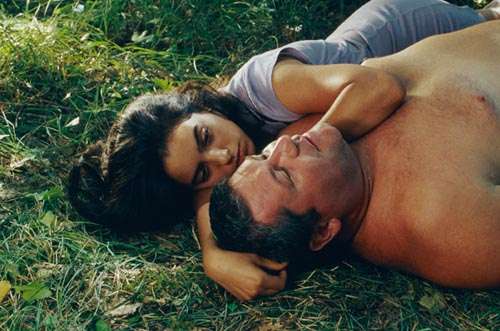
HAFSIA HERZI AND LUDOVIC BERTHILLOT
Alain Guiraudie: The King of Escape (2009)
Odd couple
In this version of a mid-life crisis story, Alain Guiraudie takes up the adventures of Armand Lacourtade (Gallic film vet Ludovic Berthillot), a well-liked and successful 40-year-old gay tractor salesmen in the South of France who falls by chance into the opportunity to try batting for the opposite team, when he rescues a 16-year-old school girl from some toughs and she falls for him.
Armand is fed up with the limited provincial gay scene and his roommate's preference for roadside tricking with decidedly older dudes. He's taken to binge eating and napping on the job and his previously very satisfied boss wants to give him a vacation. Then Armand buys off the toughs who're about to rape the sultry, dark Curly (Hafsia Herzi, a beautiful 20-something who had a key role in Abdel Kechiche's Secret of the Grain), and a world of new opportunities opens.
Before long things get complicated and then more complicated still. Armand's association with Curly draws the unwanted and decidedly disapproving attention of a tall, thin, black-suit-clad Commissioner (François Clavier), as well as Curly's mean dad (Luc Palun). Armond experiments with an aphrodisiac root (also used by out-of-control village officials) to get it up under these new circumstances, but for quite a while he and Curly are too often being harassed or pursued to be able to get it on, though when they finally do, the movie gets pretty graphic. Mad chase scenes frequently show Armand running around the southern French provincial countryside clad only in bikini briefs. For a man who's distinctly overweight, Berthillot is certainly in excellent shape. Not body-shape, stamina-shape.
Armand meanwhile is also being pursued by an older gay man, a fellow of prodigious sexual appetites who at 70 (but he looks 80!) still wants daily lovemaking, and once satisfied his wife on a daily basis (he tells us all this and more). Due to simplistic morals laws the Commissioner puts a plastic electronic tracer bracelet on Armand, and that makes the chase eventually turn into a manhunt involving cops, private citizenry, and a helicopter -- all about nothing in particular. One of the main troubles with Guiraudie's wild adventure is that arresting moments and good dialogue can't save his scenario from remaining a meaningless tangle.
Two popular outlets of French hipness, Cahiers du Cinéma and Les Inrockuptibles, published reviews praising Le roi de l'évasion ecstatically. "A hilarious, festive and liberating tale carried along by an exceptional cast" wrote Serge Kaganski in "Les Inrocks." "The hedonistic outlook makes for the gentlest film French cinema is capable of," raves Eugenio Renzi in Cahiers. "One leaves The King of Escape full of wonder," he goes on, "with the impression of having learned to desire all bodies."
The latter comment is inspired by the final scene in which a bunch of naked fat middle-aged and old gay men are all in bed cuddling.
Whether this teaches us to love, or stimulates repulsion, is another question. This is, after all, a comedy, and an oddball, sometimes shockingly crude, one at that, which often seems merely frantic and inexplicable rather than hilarious -- or liberating. It's particularly hard to perceive as liberating images of a 16-year-old girl having sex in the woods with an over-weight middle-aged man in a manner that is not to her liking. In the end, Curly doesn't get very much of value out of all this, and Armand escapes negative consequences a little too easily after his (spoiler alert!) essentially pointless experimentation has taken him pretty much back to where he started.
The positive French reactions (though of course not all were positive) can be explained when one reads another comment (from the editors of Ouest France) that this Guiraudie's film style is "Rabelaisian." Through that lens, Armand's nude cavorting round the countryside begins to make sense and seem positive. However, neither Guiraudie nor his co-authors Laurent Lunetta and Frédérique Moreau is within twenty thousand leagues of being on a par with Rabelais. Armand seems a bit too uncertain a hero to make for a true celebration of life. Call me limited, but the message I get out of this movie is that you don't know for sure if you're gay or not till you've tried straight sex; though I'm not sure any gay person needs to know this. I'm also wondering if this offhand, cliché-free celebration of gayness doesn't wind up being unintentionally homophobic. This not only isn't Rabelais; Rabelais doesn't play any more. From the modern point of view these characters are drawn too sketchily, and none of the action ever seems remotely real. Perhaps fortunately.
Opened June 15, 2009 in Paris to fair reviews. Shown as part of the Rendez-Vous with French Cinema at Lincoln Center, March 2010.
Last edited by Chris Knipp; 02-20-2010 at 10:15 PM.
 Posting Permissions
Posting Permissions
- You may not post new threads
- You may not post replies
- You may not post attachments
- You may not edit your posts
-
Forum Rules




 Reply With Quote
Reply With Quote






Bookmarks